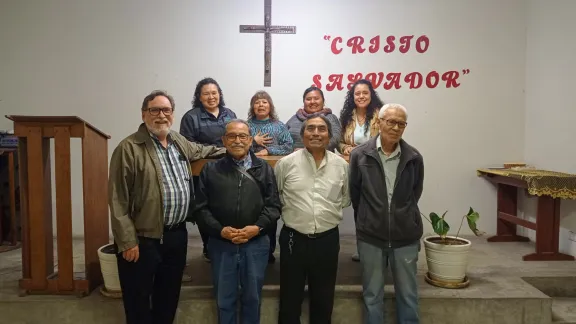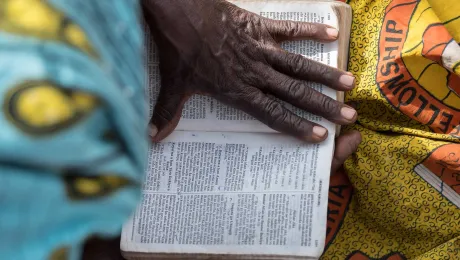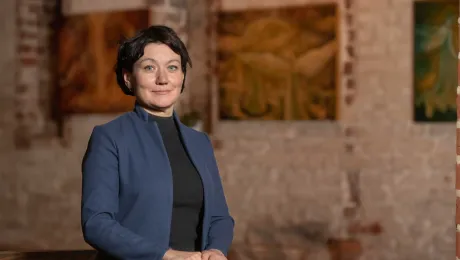
Lay leader Ernesto Huayta Girón (far right, front row), president of Cristo Salvador congregation, Lutheran Church of Peru, with other church members. Photo: ILP
LWF-supported project enhances response to internal and external factors
(LWI) – Ernesto Huayta Girón says his life as an indigenous Quechua has been marked by "perseverance and adaptation to new environments." Born in Peru's southern region of Ayacucho, the 86-year-old has lived in different districts of the capital Lima: La Victoria, San Miguel, and now San Juan de Miraflores, where he is president of the Cristo Salvador congregation, Lutheran Church of Peru (Iglesia Luterana del Perú - ILP).
The ILP lay leader reflected on the importance of leadership training for his congregation comprising mostly “older adults," now focusing on attracting young leaders "to ensure continuity in the decades to come."
A community to serve
“My relationship with Cristo Salvador began thanks to my wife, since the congregation was close to our home. We both decided to be confirmed in the Lutheran faith,” he recalled. “That was an important moment in my life, because not only did I embrace the faith, but I also found a community to serve,” he noted. Over time, he assumed leadership positions, first as vice-president and later as president.
But leading was not always easy amid internal tensions, divisions, and economic challenges. The congregation was "plunged into uncertainty" and doubt about "maintaining this space of faith and community" after a leadership transition complicated its registration process. In 2024, the ILP proposed a "pastoral accompaniment" training, which The Lutheran World Federation (LWF) supported through its Member Church Projects program.
Girón was among congregation leaders who trained in administration, legal procedures, counseling and other aspects that he says "marked a before and after" for Cristo Salvador. Learning the importance of keeping records including membership lists and minutes, and finally "achieving the legal registration of our congregation gave me the security I needed to take back the reins of leadership," he recalled.
The responsibility is not just to lead; it is to serve and adapt and build a solid future for all who are part of this faith community.
Ernesto Huayta Girón, president, Cristo Salvador congregation, Lutheran Church of Peru
Ensuring continuity
In the end, the training was not just about the bureaucratic aspects, said the ILP congregation president. "It is about ensuring the continuity of our spiritual work, guaranteeing a stable future for our church and setting a precedent for other Lutheran congregations." Girón added that at his age, "the responsibility is not just to lead; it is to serve and adapt and build a solid future for all who are part of this faith community."
Expressing gratitude for LWF's support, he said the pastoral accompaniment project was an encouragement "to think about the future and prepare the ground so that the new generations—who are absent today but will be indispensable tomorrow—will have a space where they can assume responsibilities." Although young leaders are not yet actively involved, "we now have the necessary tools to attract them, train them and accompany them in their growth. In this way, we will ensure the continuity of the congregation in the decades to come," he concluded.
LWF's commitment through member church projects empowers churches across the communion to address local challenges and identify new opportunities. Equipping church leaders with the essential training and tools to serve contributes to meaningful transformation at congregational and community levels.
This project demonstrated "what hope can look like in a particular context of a congregation, when mundane issues like ensuring proper registration and strategic investments in leadership create a sense of purpose for the future," noted Rebekka Meissner, LWF Program Executive for Member Church Projects.


